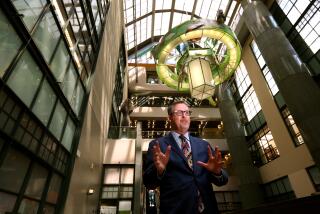Wellspring Is Font of Information for Computer Users
- Share via
A spring flows from deep within the Biomedical Library at UC Irvine, a source not of water but of information.
The Wellspring, as it’s officially known, is a 6-year-old computer bulletin board system accessible to anyone with a personal computer and a modem. And although it was originally intended primarily for Orange County callers, the system has proved so popular that it now receives calls from as far away as Turkey and South Africa.
And no wonder: Where else can a caller get information not only on human ailments, but computer viruses as well? Just to keep things interesting, mixed in with the serious stuff is background information on the adventures of the Starship Enterprise and off-the-point comments from cartoon character Zippy the Pinhead.
The board is the brainchild of librarian Steve Clancy, who started it on the original IBM personal computer he was issued by the university more than eight years ago.
“We got computers in 1983 or ‘84, and we had to learn to use them ourselves,” Clancy recalls. Before then, Clancy was familiar with doing research with computer databases, but he only had access to them through “dumb” terminals--computer-like systems without brains of their own.
Clancy decided to use his computer to give the community a different kind of access to the wealth of medical information available through the library. Although the Wellspring does not provide direct access to other databases, users can peruse bulletins from such sources as the Centers for Disease Control or even message Clancy with questions about specific subjects.
“It’s an unofficial outreach of the library,” he says. “Our main reason for being here is to serve the students and the medical school, but we also serve the community. This is a good way to let people know you can get some answers here.”
Callers tap the Wellspring for health-related information, particularly about AIDS. Clancy assembles information from several AIDS bulletin boards in California and elsewhere to keep users up to date on new treatments and research. He also posts bulletins featuring articles he’s researched for library patrons under the heading of “Hot Topics in Medicine.”
He has access to major databases such as Medline, a service of the National Library of Medicine. But since the Wellspring is only a part of his job as a reference librarian, Clancy isn’t able to do exhaustive research in response to each query.
For extensive searches of the medical literature, Clancy suggests that local callers visit the library in person. For out-of-town Wellspring members, he offers referrals to local university libraries.
Calling the Wellspring requires any type of personal computer, a modem to connect it to a telephone line and some sort of communications software. The system has two lines, and during peak hours from about 3 to 11 p.m., both are frequently busy. All users are listed under their real names, except for those such as people with the HIV virus who need confidentiality. “But I have to know who they are in any case,” Clancy says.
For those who don’t have computers or would prefer talking to a live person, the library’s reference staff also take voice calls. The library gets a lot of those, Clancy says.
“You’ll get someone who’s calling for themselves, or a close family member, or someone in another state,” he says. “A typical question might be, ‘My physician prescribed this drug for me, and now I have headaches. Could the drug be causing this?’ ”
Clancy says the librarian can find reference materials on drug interactions and side effects and read it to the caller, “but we can’t interpret it because we’re not physicians.”
Nor can they speculate on a diagnosis for callers who describe their symptoms and ask the librarian what their problem might be.
“Occasionally you get feedback from someone who says the information we gave them helped them talk to their doctor about something, or they were able to pass it along to a granddaughter or someone who needed it. That’s rewarding,” Clancy says.
“Or, I remember a student who was doing a paper on chronic fatigue syndrome, and we were able to come up with a list of information sources.”
As the system operator--known in computer jargon as a sysop-- of the Wellspring, Clancy gets almost as many questions about computer viruses as he does about human ones. He answers those as best he can, often from personal experience, since the Wellspring equipment has had its share of problems over the years.
The computer on which it is based has been running virtually 24 hours a day since the board started in October, 1985, although its hard drive and some other system components have needed to be replaced. Fearful that the aging system might soon breathe its last byte, Clancy has begun soliciting donations from users to buy new equipment.
With more than $800 in donations from the community, Clancy was able to persuade the university to kick in more financial support as well, and he hopes to have the board running on a newer, faster computer by summer. By then, the service may also be expanded to include a psychology sub-board operated by a local clinical psychologist.
But with state budget cuts, Clancy still needs private contributions to keep the Wellspring healthy. “The state budget is having major, major problems right now, so much so that even $50 for a shareware program could be too much to spend. The university library system had canceled $315,000 worth of (medical) journals, more than 1,400 titles, because we just can’t afford it,” he says.
Pharmaceutical companies, medical device manufacturers, private physicians and lay persons can also request professional searches of the medical databases for a fee of $70 per hour, plus connect-time charges for computer networks, Clancy says, with a minimum charge of $35.




